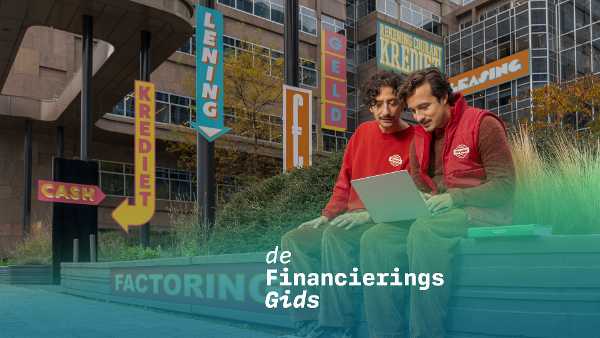Finding funding to start your business
- KVK Editors
- Background
- 13 November 2024
- Edited 28 October 2025
- 5 min
- Managing and growing
- Finance
You have a great idea for a new business and a lot of energy, but perhaps not enough money. Whether you're starting an online shop, wanting to open a restaurant, or developing a new product: without sufficient funding, you will not get very far. How do you get money to start your business? Follow this step-by-step plan to finance the start of your business.
1. Develop your business idea
A financier such as a bank, investor, or subsidy provider will want to see that you have thought carefully about your new business. So, develop your idea in a business plan. And work out the finances in a financial plan.
Make a business plan
A business plan is made up of these parts:
- The entrepreneur: Who are you? What are your qualities and skills? Why do you want to start as an entrepreneur?
- Your business: What will your business do? Which legal structure will you use? Will you be hiring staff? And where do you think your business will be in a few years?
- The marketing plan: Who are your customers and what do they need? Who are your competitors and what makes your business different? What are the developments in the industry and how will you respond to them?
Make a financial plan
In the financial plan, you show the financial feasibility of your idea. You set out how much money you need, what you will use the money for, and how you intend to make a profit. The financial plan consists of 4 budgets:
- Investment budget: how much money do you need to start your business? Consider expenditure on equipment, stock, the deposit for renting premises, and working capital.
- Financing budget: where will you get the money for your investments? For example, your own money, and money you will borrow.
- Operating budget: what turnover do you expect and what costs do you have? Make a realistic estimate.
- Liquidity budget: when is money coming in (income) and money going out of your business (expenses)? You can use this to see whether you have enough money or are short of it at any given moment.
Together with an adviser with the quality mark Erkend Financieringsadviseur MKB (SME Financing , in Dutch), you can draw up your financing plan and submit the application.
2. Choose the right type of financing
There are many ways to finance your business. Ask yourself the following questions, then you will know where to start looking:
- Do you have your own money that you can use?
- Are there any subsidies or schemes you can use?
- Do you need to borrow money or find an investor? This is external financing.
Private money
Start with yourself and see how much private money you have and how much of that you want to put into your business. That gives you a starting amount. You will also need this to attract external funding. Usually, financiers want you to also put your own money into your business.
Subsidies and schemes
No subsidies are available for the actual start-up process of your business. Subsidies for entrepreneurs are mainly available for product development, doing research together, sustainable improvements, and innovative projects. Research possible subsidies and .
As soon as your business is active, you can use tax schemes. These give you a tax advantage. For example, the tax relief for new (startersaftrek).
Starting with benefits
When starting a business with benefits, always consult your benefit organisation beforehand.
- Do you want to start a business and are you currently on social assistance ? If so, the financial support for self-employed (Bbz) offers possibilities for supplementing your income and a loan for your business.
- Are you starting with unemployment ? There are possibilities to start your business while retaining part of your benefit.
- Are you starting with a wage dispensation for employment of disabled workers ? Or a WIA after a long period of illness? Discuss the possibilities with your UWV adviser.
Find external funding with the Financing Finder
If yoiu need external financing there are various ways to arrange this.
To find suitable external financing, you can use the Financing Finder Tool. By answering a few questions, you can see the forms of financing that best suit your situation. And recognised financiers who offer that financing.
Borrow money from friends or family
In addition to the suggested financing types in the Financing Finder, you may also be able to borrow money from family or friends. This is called a private loan. It is a loan without the involvement of a bank or other lender.
Microcredit
Another option for starters is microcredit from Qredits. This organisation offers credit combined with coaching.
Financing mix
Increasingly, you need to have different types of financing because you cannot borrow the total amount from one lender. For example, you supplement your own money with a loan from the bank and leasing for your assets. Combining financing is called stacked financing or a financing mix.
3. Apply for financing
You have found an overview of possible forms of financing and who offers them via the Financing Finder. Each provider has its own requirements. Check these in advance and then make your financing application.
The elements of a financing application
With your financing application, you want to convince the financier. Clearly state what you need the funding for. And make it clear that you have thought about repaying the loan. To do this, make a repayment plan. In it, show how you will repay the loan amount and when. And what guarantees you can give the financier if repayment fails. In the repayment plan, also consider your private withdrawals or your own salary. You also need to be able to make a living from your business before you can repay the financing.
Read more about preparing a financing application. Do you need extra help? Find out who can help you write your funding application.
What do financiers look for?
A financier often looks at a starter’s funding application more critically than that of an existing business. The financier goes through your application and divides the information into ‘hard’ and ‘soft’ information.
Your company's figures
The hard information is what a financier can check directly with figures, concrete data, and documents. As a starter, you cannot yet provide figures from previous years. So you must make do with a realistic forecast. A financier will estimate how likely it is that your forecast will come true. You can back up the forecast with figures from similar businesses and market research.
You as entrepreneur
The soft information is information about you as a starting entrepreneur. Make it clear what knowledge and skills you have that will help you as an entrepreneur. Also show that you are motivated to make your business a success. Financiers also take this information into account in their assessment.
Read more about what financiers look for when assessing your business loan application.
BMKB credit guarantee scheme
A lender pays attention when assessing whether you have collateral for the loan. Do you not have enough collateral to get a loan? Then the SME Credit Guarantee (BMKB) can be interesting. This is a Dutch government with which the government guarantees repayment of part of the loan. You can then borrow more than you would get based on your collateral. Your financier can apply for the BMKB on your behalf.
4. Get help and advice
You do not have to arrange funding for your business on your own. You can turn to various organisations for help. Call the KVK Advice Team on 088 585 11 11. They will think along with you and put you in touch with experts from the KVK network. You can also ask your own bookkeeper or accountant for help.
More information
Go directly to:


